| |
"What if there were a list? A list that said our finest actors weren't allowed to act, our best writers weren't allowed to write, our funniest comedians weren't allowed to make us laugh. What would it be like if there were such a list? It would be like America in 1953." |
| |
The very neat tagline for The Front |
The Hollywood Blacklist remains to this day a dark stain on America's past. The very idea that you could effectively be branded a criminal and prevented from working in your chosen profession because of your political beliefs is not only abhorrent, it flies in the face of what the American Constitution is supposed to stand for. And we're not talking about angry radicals looking to bring down the government in an armed revolution, but people who came together to support their fellow workers, to fight for those on the lowest rungs of the societal ladder and for a society based on fairness and community rather than greed and contempt.
There's never been any question that many of those targeted were at one point or another members or supporters of the American Communist Party, but it's worth remembering that for the first few decades of the 20th Century, this party was a key driving force in the battle for equal rights in American society, opposing racism and actively supporting the formation of labour unions in order to raise wages and improve working conditions for their members. In the 1920s and 30s, if you were passionate about workers' rights, race and gender equality, and making a stand with others against a system controlled by the wealthy and well-connected, then the Communist Party was a logical choice. And although some of those who joined the party in their youth remained loyal to it in subsequent years, many abandoned it because of its support for Stalinist Russia, but to the witch-hunters running the pompously named House Committee on Un-American Activities (aka HUAC), this mattered little. To them, communism was a conspiratorial poison running rife though the American entertainment industry, and anyone who had ever even shown an ounce sympathy for someone with left-leaning views was perceived to be a threat to everything they held dear, including their own appalling sense of self-importance. Once a communist, always a communist, and it didn't matter a hoot if you were a paid-up member or had long ago bought a political pamphlet or attended a march in support of your fellow workers – to the HUAC, you were permanently tainted, and could only wash yourself clean by pointing your finger at others who were similarly stained.
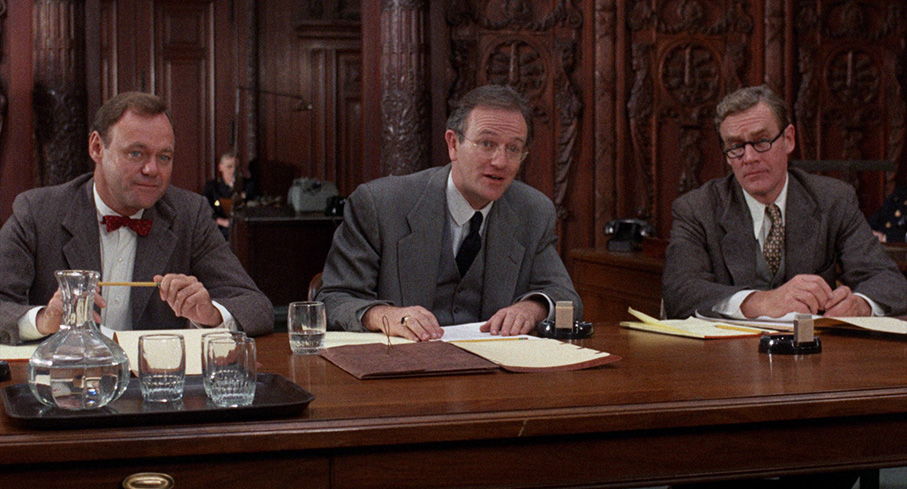
The worrying thing is that some of those now in positions of power in the monstrous charade that America now has for a government actually look back on these hearings and their ghastly instigator, Senator Joe McCarthy, in a positive light. And lest you think the concept of blacklists is a thing of the past, it's worth reflecting on the fact that a more surreptitiously operated blacklist was for many years part of the British building industry's modus operandi, targeting those who dared to raise issues about site safety or who became involved in union activity, ensuring that they would not only lose their jobs, but would not be unable to find similar work elsewhere. And some of the reasons that unaware building workers found themselves on this list are as preposterous as those used by the HUAC – in a database seized by the Information Commissioner's Office, black marks against workers included, "Talks like a young Alf Garnett" and "wears anti-Nazi League badges and insignia." (You can read the comprehensive Guardian story from which those quotes were drawn here.) Who knows how many other such blacklists are currently being kept and circulated by companies and corporations both here and in the US, two countries where employment rights soon look likely to take their biggest hit in years?
Despite the fact that countless careers and lives were wrecked by the Hollywood blacklist, Hollywood itself has been dispiritingly reticent to explore the full extent of its devastating impact, despite a (very) small number of valiant efforts to do so. This is partly down to a model of moviemaking that requires a film to entertain first and ensure that its social or political points do not upstage the drama, and studio execs are unlikely to see much commercial potential in a film that may will leave its audience upset and angry, particularly as those very studios were ultimately complicit in the blacklist process. Thus, those select few films that have made the impact of the blacklist a key aspect of their story – Irwin Winkler's 1991 Guilty by Suspicion and Jay Roach's 2015 Trumbo come readily to mind – tend to pull their toughest punches, despite their undeniable strengths and fine intentions. Predating them both by a good many years is the 1976 The Front, the first Hollywood film to tackle the blacklist (the HUAC was only disbanded the previous year) and whose comical edge is employed to gently mock its absurdities and the unscrupulous behaviour of its investigators.
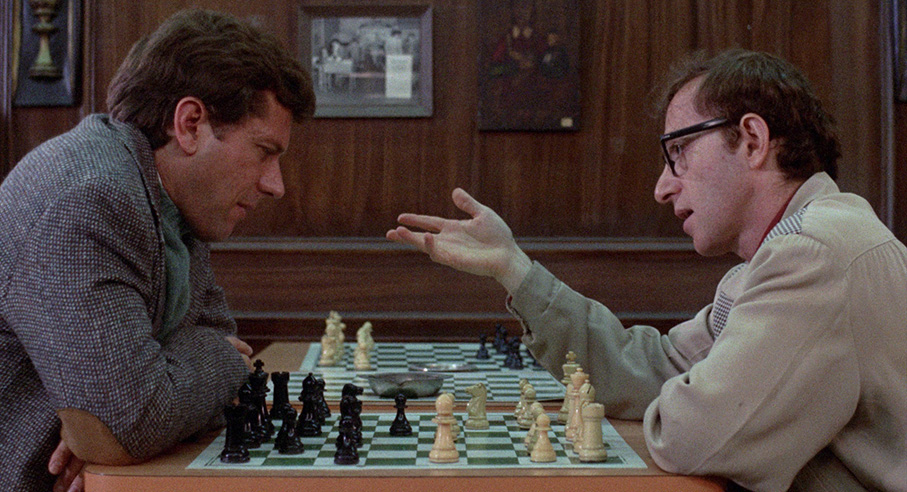
In 1953, when the McCarthy-led investigation into Hollywood was at its peak, bar cashier Howard Prince (Woody Allen) is approached by his childhood friend, blacklisted television writer Alfred Miller (Michael Murphy), to ask him to act as his 'front' by putting his name on Alfred's scripts so that he might be able to continue to sell them. Alfred offers Howard a percentage of his writer's fee, and as someone who sidelines as a bookie and seems to owe money all over town, he readily accepts. Alfred's talent ensures that their first submitted script is warmly received, and in no time at all Howard is called to the studio to meet network producer Phil Sussman (Herschel Bernardi) and celebrated performer Hecky Brown (Zero Mostel). He also finds himself instantly attracted to Sussman's script editor Florence Barrett (Andrea Marcovicci), who is a great admirer of what she believes is Howard's work. Howard romances Florence and quickly becomes seduced by the attention and lifestyle that comes with being a respected figure in a medium in which the writer has status on a par with the actors. Now making more money than he ever did as a cashier or a bookie, Howard presses Alfred to let him front for two more writers, but fails to realise that he too has become the target of an HUAC background check.
That director Martin Ritt and screenwriter Walter Bernstein choose to find humour in this sober subject is never an issue here, and given that both men were victims of the blacklist themselves, they have more right than most to approach the subject any way they choose. This is, after all, not a film specifically about the blacklist – for that, see David Helpern's 1976 documentary Hollywood on Trial – but a comedy-drama (although given the emphasis, maybe that should be drama-comedy) built around a consequence of being blacklisted that both Ritt and Berstein were all too familiar with. And far from making light of the situation, they riff on its absurdity, which allows them to portray those who seek to enforce the blacklist seem blinkered, vindictive, self-righteous and just a little drunk on the power without ever having to stoop to obvious caricature. This is particularly evident in the determination of lead investigator Francis X. Hennessey (Remak Ramsay) to get something on the apolitical Howard, even after his initial enquiries turn up nothing. For him, there really is no smoke without fire, even if he is the one generating the smoke, and if a writer or actor or director is clean, then there's clearly something suspect about that as well. Little wonder that these proceedings and trials were compared to the witch hunts of the past where to be accused was to be found guilty by default, a connection that was the basis of Arthur Miller's 1953 play The Crucible, in which the late 17th century Salem witch trials were designed as an allegory for the activities of Joe McCarthy and the HUAC.
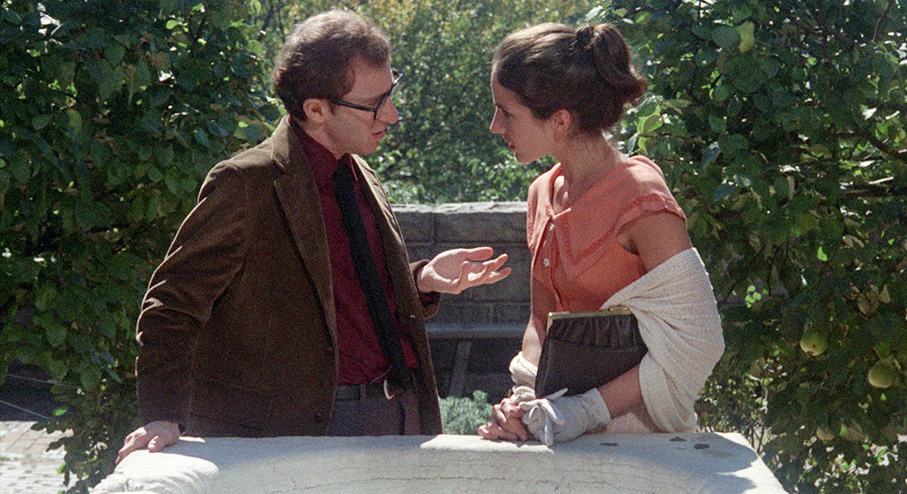
I'll confess up front that I'm probably not the biggest devotee of Woody Allen as an actor. It's not that he can't act or that he doesn't have a strong screen presence – he can and he does – but Allen plays Allen in every film I've seen him in with precious little variation in style, delivery and even appearance. I thus know almost exactly what I'm going to get from an Allen performance even before I sit down to watch the film in question. The thing is, there are some roles that this persona is just right for, and just occasionally it can be toyed with in interesting ways. His lead role in The Front is one such example. In what remains a rare example of Allen agreeing to be directed by someone other than himself, he is transformed over the course of the film from likeable hustler into a self-centred dick, one who unthinkingly buys into the image of himself that has been generated almost solely from the graft of others. This fragile bubble of self-importance comes close to bursting when he tells two other writers that he is fronting for that their latest work is not up to the standard expected of a Howard Prince script, a scene that pushes credibility but is rescued by Michael Murphy's convincingly indignant response. And Murphy is so good here as the film's moral centre, creating in Andrew a sympathetic character grounded firmly in reality, one who displays none of the ego that so infects the talentless Howard – Andrew cares not whose name is on the credit, he just wants to write and see his work performed.
A strong supporting cast enlivens even the smaller roles (don't blink or you'll miss an early appearance by Danny Aiello as a greengrocer to whom Howard owes money). But the real star of the show is Zero Mostel in a wonderfully pitched and ultimately heart-breaking final screen performance as Hecky Brown, a role clearly designed to inversely reflect Howard's upward career trajectory. When the two men first meet, Hecky is already under investigation by the HUAC, and just as Howard's fortunes rise, Hecky's start to tumble, as he is quietly removed from his job by the network and forced to perform for a cut-down price at a club in the Catskills, where a manager to whom he was once close won't even pay the agreed-on price, and ends up lambasting him for being a "red bastard." It's a trip on which Hecky is joined by Howard, on whom he has been instructed to spy by Hennessey, a request he complies with in the vain hope that it allow him to work on TV again. It's through his gradual downfall and emotional disintegration, and particularly his final scene (which is all captured in one perfectly choreographed shot) that Ritt and Bernstein explore the real impact of the blacklist on those who find themselves robbed not just of their position and livelihood, but their dignity as well. His suffering is made all the more poignant by the knowledge that much of what Hecky goes through was drawn directly from Mostel's own experience, having also been blacklisted after refusing to name names when hauled before the HUAC. Coincidentally, it's in his scenes with Hecky at his lowest ebb that Allen is at his most convincingly natural, and the look on his face as he watches from a distance after events take a particularly dark turn is painfully real, and the moral dilemma he faces when asked to name Hecky at his own hearing later is written all over his subtly expressive face.
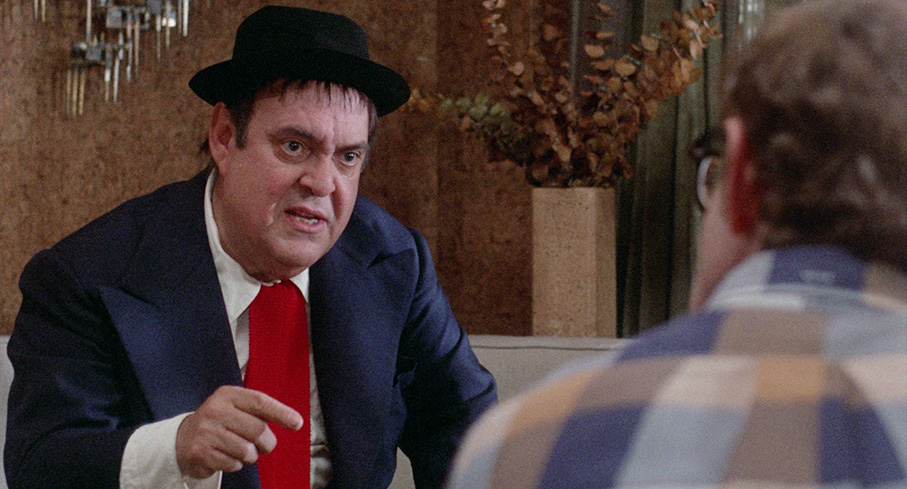
That Howard starts to realise the error of his ways and attempts to make amends in the later stages is perhaps inevitable, and serves to re-align us with him for the film's climactic scene and its utterly delicious parting line. History dictates that he's unlikely to beat committee at their own game, despite his naïve conviction that he can somehow outmanoeuvre them, but the fact that Ritt and Bernstein still choose to end their film on a note of defiance is pleasingly and appropriately uplifting for this story. It also plays as a middle-finger salute to those self-righteous bastards who now have since found themselves cast as the bad guys of history, at least by anyone with an ounce of decency in them. It's a most satisfying cap to a consistently engaging, smartly written and winningly performed drama, one with comic overtones and a worthy and heartfelt political edge that's carried through nicely to the closing credits, which begin with a list of those who worked on the film who were blacklisted themselves. Gentlemen, we salute you.
Sourced from a Sony 4K restoration from the original negative, the 1.85:1, 1080p transfer on the Blu-ray in this Dual Format set is a lovely thing to behold. Everything is spot on, from the crispness of the picture detail to a warmly naturalistic and pleasantly pastel-leaning colour palette and the perfectly pitched contrast. This is aided by cinematographer Michael Chapman's decision to light the film in the manner of a 50s TV show, which strips the film of pockets of tricky-to-transfer gloom and renders even more naturalistically lit interiors clearly. Daylight exteriors look terrific throughout, and there are no traces of damage or dirt or distracting DNR.
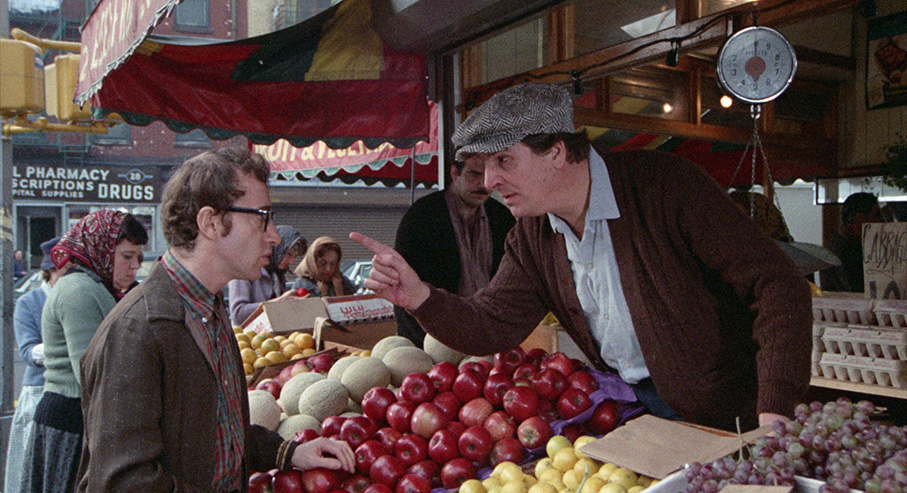
The Linear PCM 1.0 mono soundtrack is also in excellent shape, boasting a very solid dynamic range for a non-DTS track (the bass notes of Dave Grusin's score have a surprising amount of punch) and very clear rendition of dialogue and effects.
There's also a music and effects track for those who enjoy these curious extras, and optional English subtitles for the deaf and hearing impaired are available.
Audio Commentary
Special features regular Nick Redman plays host to an excellent commentary track featuring fellow film historian and essayist Julie Kirgo and actress Andrea Marcovicci, who plays Florence Barrett in what was her first feature role. So packed is this commentary with anecdotes about the filming and background information on the characters, the actors, the filmmakers and the blacklist itself, that it's difficult to give even a flavour of the content without short-changing the contributions of all three. Even as a student of the blacklist and its impact I learned a few things here, and the detail provided by Redman and the energetic Kirgo, and (especially) Marcovicci's recollections of the shoot, had me captivated throughout. Marcovicci admits to being a little bit in love with Woody Allen at the time and claims that he was a terrific a great kisser (you live and learn), recalls attending a Catholic school in which a "Better Dead Than Red" poster was prominently displayed, and has nothing but wonderful things to say about Zero Mostel, who was always entertaining the cast and crew on set, the flipside of the more reclusive Allen. I was amused to learn that Allen's uncomfortable response to being hugged by Mostel when their caharcters first meet was actually a genuine response from someone who dislikes being touched, and the solidarity of the detestation of the blacklist and the career-destroying power games played by those who enforced expressed here is genuinely inspiring.
Michael Chapman on The Front (6:14)
Drawn from the same Web of Stories interview with director of photography Michael Chapman that you'll find on Indicator's dual format release of The Last Detail, this covers limited ground but in interesting detail. It's here that I learned that Chapman consciously lit the film in the manner of a 50s TV show, and also what he feels is far and away the film's greatest strength: "What's amazing in it is not Woody Allen, and not the story, which is OK but rather perfunctory in a rather jokey way, but Zero Mostel's performance." He also discusses the choreography of Mostel's single-shot final scene, which he worked out with Mostel, with seemingly little input from Ritt, who was far more interested in the actors than camera setups.
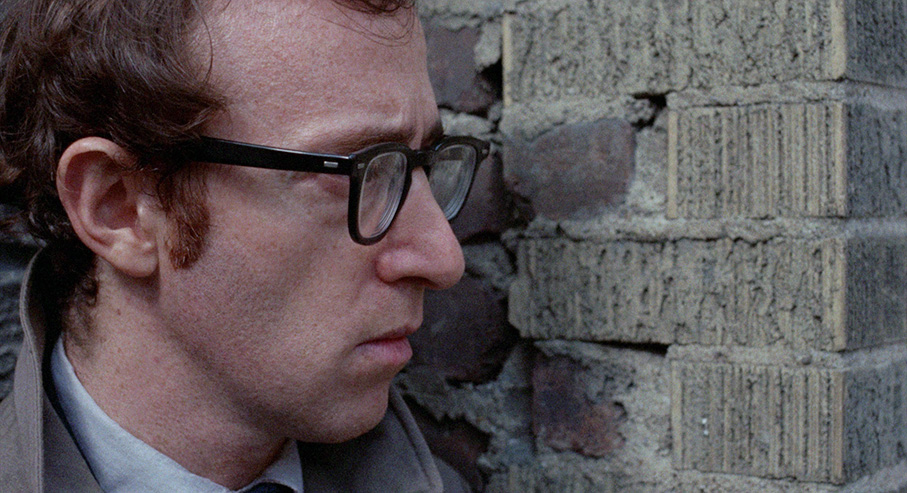
Theatrical Trailer (1:53)
A neat enough trailer that starts seductively with the top-quoted tagline and then goes on a serious spoiler binge. I'd save this for later.
Gallery
19 production stills and 4 posters, one of which – I'm guessing from the title that it's Czech in origin – is rather superb.
Booklet
The booklets that accompany Indicator releases are fast becoming real standard-setters, and this is no exception. Running for 40 enthralling pages, it opens with a detailed and compelling new essay on the film by Professor Gabriel Miller, one that picks up on so many of the points that I'd made in my own review that I briefly considered going back and re-writing it. This is followed by a lengthy 1986 interview with director Martin Ritt in which he talks about his own experiences of the blacklist and his views on political filmmaking, a shorter 1987 interview with Walter Bernstein in which he reflects on the impact of the blacklist on his own career, and a brief but welcome chat with Woody Allen about his work on the film and his views on its subject matter. Full credits for the film, information on the transfer and production stills have also been included.
It's been a good many years since I first saw The Front, and frankly it plays even better than I remember and continues to be relevant at a time when far too many appear unaware that such a blacklist ever existed. While not the no-punches-pulled political drama that I'm still hoping will one day make its way to the screen, this is still a passionate and engrossing work with a comical edge and some very fine performances, one that doesn't sidestep the terrible impact that actions of the HUAC had on those it spitefully targeted. A fine film, a superb transfer, a terrific commentary and a first-class booklet make this a must-have. Highly recommended.
|